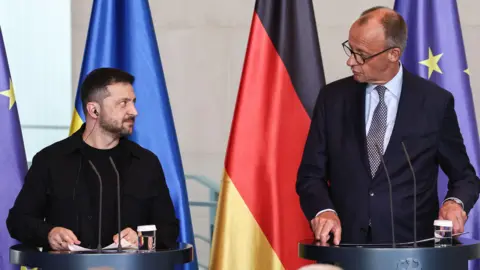In a significant development concerning European diplomacy, leaders displayed cautious optimism following a virtual meeting with Donald Trump, just two days before he is set to meet Russian President Vladimir Putin in Alaska. The central focus of their discussions was the ongoing conflict in Ukraine, which has raised alarm across the continent about security and territorial integrity.
During the conversation with European leaders, which included key figures such as French President Emmanuel Macron, German Chancellor Friedrich Merz, and UK Prime Minister Keir Starmer, Trump reportedly expressed his desire to achieve a ceasefire between Russia and Ukraine. He also highlighted the critical importance of involving Ukrainian President Volodymyr Zelensky in any negotiations concerning territorial disputes, alongside guarantees for security.
This virtual meeting served as a strategic engagement, allowing the European leaders to clarify their expectations and anxieties regarding the upcoming summit between Trump and Putin. Macron emphasized that speaking to Trump facilitated a clearer understanding of his intentions while enabling European leaders to advocate for Ukraine’s interests. Such engagements are crucial as the intricacies of diplomatic negotiations unfold, especially in a context marked by historical tensions and geopolitical stakes.
The coalition of leaders—from the UK, France, Germany, Italy, Finland, Poland, along with European Commission President Ursula von der Leyen and NATO Secretary General Mark Rutte—aimed to emphasize the importance of Ukraine’s interests amidst concerns that they could be overshadowed in negotiations. The urgency of the matter was further compounded by Trump’s remarks that rated the meeting as “a ten” and warned of “very severe” consequences for Russia unless it ceased its military actions in Ukraine.
Despite these reassurances, the European leaders remained vigilant. In their subsequent statements, they reiterated the necessity for Ukraine’s involvement in any final agreements, revealing an underlying anxiety that Putin may maneuver Trump into concessions that could imperil Ukrainian sovereignty. Poland’s Donald Tusk echoed this sentiment, stressing the importance of ensuring that Europe reinforces Trump’s understanding that Russia cannot be trusted.
The geopolitical landscape is further complicated by Russia’s rigid position regarding territorial negotiations. Russian officials have consistently maintained their demands, which include the withdrawal of Ukrainian forces from occupied territories and Ukraine’s formal abandonment of ambitions to join NATO. These maximalist demands have raised concerns among Ukraine and its Western allies, as they perceive them as potentially paving the way for future aggression should any concessions be made.
On the ground in Ukraine, these developments have been met with skepticism. President Zelensky has expressed doubts about Russia’s intentions, cautioning that any territory allowed to remain under Russian control could serve as a launchpad for future incursions. The discussion of security guarantees has emerged as a pivotal element to counter this perceived threat, aimed at ensuring Ukraine’s long-term defense amid the ongoing conflict.
UK Prime Minister Keir Starmer remarked on the strides made during the talks, indicating that there is a newfound possibility for a peaceful resolution to what has been a prolonged conflict. This is part of a broader strategy from the UK and France, which have been spearheading efforts to create a “Coalition of the Willing,” a collective committed to deterring Russian aggression.
Meanwhile, as the political situation grows increasingly fraught, Russia continues its military operations, exemplified by recent offensives in key regions like Donetsk. Zelensky labeled Putin’s assurances about the effectiveness of sanctions as mere bluff, pushing for more stringent measures to be imposed on Russia.
Trump’s forthcoming meeting with Putin is being characterized as a defining moment, with the stakes incredibly high. The outcome may hold significant consequences for the ongoing humanitarian crisis in Ukraine, as well as for the stability and security of Europe as a whole. As global leaders remain on high alert, the negotiation strategies and diplomatic engagements leading up to this summit will be closely scrutinized, with the hope that a viable path toward peace can be established.











